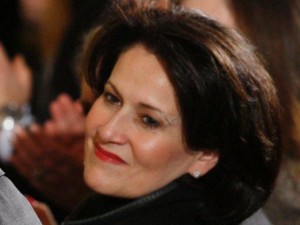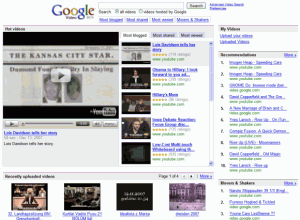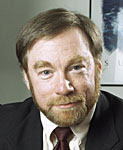My Video Conference with Anita McBride on C-SPAN
If Anita McBride could go back in time, and meet any first lady, she said that she would pick, “Dolly Madison –because when the president’s opponents would come to see him, she used her personality and hostess abilities to drive debate; they would leave feeling like friends,” said McBride.
McBride participated in a C-Span video conference on Thursday, April 14, 2011. C-Span was able to include college students from George Mason University, University of Denver and Purdue University in on the occasion as well. McBride answered questions from all three schools and some from Steve Scully, the political editor for the C-SPAN networks.
She informed us of the role and responsibilities of the first lady.
She emplesizied that the position of First Lady is “probably the most important and most demanding unpaid job in the world.” McBride was the White House Chief of Staff for the first lady from 2005-09 for Laura Bush. She also worked through the Reagan, and both Bush administrations.
The job of the First Lady is to pick a focus and an issue that she cares very deeply about. Laura Bush is passionate about reading, so it made sense for Laura to support Education Initiatives, McBride mentioned.
Currently, McBride is an avid member of the U.S.-Afghan Women’s Council and is a chair on the William J. Fulbright Foreign Scholarship Board. She is also a consultant for the executive service firm Global Political Strategies.
As of 2010, McBride became appointed as the executive in residence at the Center for Congressional and Presidential Studies (CCPS) at American University’s School of Public Affairs.
Filed under Uncategorized | Comments (2)Briggs Chapter 8
Telling Stories with Video
The digital video revolution: One person can now make and produce high-quality Web video with a $200 camera and laptop or desk computer instead of paying $35,000 for a camera and an expenisve editing station.
Briggs went into highlights and explinations of:
- Capturing quick video highlights, not documentary projects.
- Managing digital video on your computer.
- Using common software to edit video.
- Choosing online video hosting services.
- Driving audience to your video.
What is the impact of digital video? Did you know, by mid 2009, Youtube reported that 20 hours of footage was being uploaded to the video-sharing site every minute?
One of the most important suggestions Briggs wrote was, “Perfection is not necessary.” Quick and less polished video often draws bigger audiences! Some newspapers changed their approach to video, and alloweing video broadcast with cell phones for real time news events.
Great ways to plan your video and go are:
- Use different approaches for different projects.
- Try storyboarding.
- Mix your shots.
- Build five-shot sequences.
You also need voice and audio and still shots before the editing process. After all that, upload your news video!
Filed under Briggs | Comment (0)Lecture by Brad Kalbfeld, former AP Managing Editor/ Broadcast
On Tuesday, April 5, 2011, Brad Kalbfeld stopped by George Mason University to talk to Online Journalism students. Kalbfeld is a digital pioneer. You can check out his website, Interactivity, LLC.
For more than 36 years, he has been a :
- writer
- reporter
- editor
- news executive
- including 22 as Managing Editor/Broadcast for The Associated Press.
Kalbfeld was responsible for AP’s broadcast wire, audio and domestic video operations and has produced coverage of such major events as 9/11, the wars in Afghanistan, Iraq and the Persian Gulf, two space shuttle disasters and five presidential elections.
He started out the lecture by showing off his laptop in the 1980’s. It was a typewriter. He then went on to show us his electronic laptop he got in the early 1990’s.
Kalbfeld’s description of the event. who is the source of a story (ie: Reporter or “Joe Six-Pack”) and how the information trickles down the .
The news event process is like this:
- Event happens
- Reporter OR “Joe Six-Pack” reports on it
- Copy Editor okays it
- Section Editor/ Show Producer okays it
- This can go straight to the Reader/Viewer OR go to a Managing Editor before going to the Reader/Viewer
A student in class, Melissa Sathmary said, “Citizen journalists have the opportunity to fabricate stories though, like Balloon boy.”
Responding Kalbfeld said, “Professional journalists are scared of citizen journalists. So there is a pressure to give more credence in their articles.”
Investigative journalism has changed in the past 36 years. “There is less money involved on the local level for investigative journalism. However, it is a great way to get attention. And if you do that enough, it’s a great business plan to make money. It is one of the chief ways investigative journalists can make enough money to make a living,” said Kalbfeld.
He wrapped up the lecture by saying, “The world is your new editor”.
Filed under Lecture | Comment (1)Lecture by B.J. Koubaroulis from The Washington Post
Mason Alum! It’s not just basketball; B.J. Koubaroulis is continuing to make the Patriots look good!
“A Washington Post sports writer/producer and CEO of Synthesis Multimedia Productions/Koubaroulis LLC,” Koubaroulis’ twitter biography defines him.
He gradated GMU in 2004, “Like everyone, you expect to be covering the Yankees, and then you realize you’re covering High school JV girl’s lacrosse; kind of heart breaking. You start from the bottom but that’s how you learn,” said Koubaroulis.
Regarding his company, Synthesis Multimedia Productions, Koubaroulis said, “We go to a game and produce a package from the game. A lot of people can produce video, but what makes us unique is the fact our game packages are ready in two hours.”
Ask the Caps! BY THE WAY, The Washington Post’snew hot niche is a media ploy where readers can submit questions to players of the Capitol’s. Guess who hosts the three minute video? Koubaroulis does! Check it out, Matt Bradley, answers!
He urged his fellow Patriots to learn these different aspects of multimedia journalism. “Anybody can do what we’ve done. You just need to buy to equipment. It doesn’t have to be expensive. Get something cheap off of Craigslist,” Koubaroulis said.
Filed under Uncategorized | Comment (0)Lecture by Mark Potts from Recoveringjournalist.com
He’s here! Mark Potts is right here in front of me. About ten feet away, honestly.
Here is his site. He follows almost thirty fabulous blogs as well, see it under his Essential Readings tab.
Potts said, “I think a lot of journalists—and traditional media executives—are caught up in old ways of thinking about the industry that are being wiped clean by the digital revolution. Without radical new approaches, the old journalistic institutions are suffering through horrible death spirals.”
Regarding hyper local media. Potts said “TBD.com did an amazing job trying to get all the little blogs together. We’re going to link to you and drive traffic to your site. TBD was an incredible model. You’ll see other model’s like that spring up across the country.”
“Darwinian and dog eat dog,” said Potts. Networks of blogs in neighborhoods are becoming very important. People are proud of their community and if they don’t do a good job, the community will reject them.
Passion is what journalism comes down to in hyper local media. People who blog for their communities don’t do it for money! You want people to care about the communities. “Reporters will not care about the pot holes in the road, if it is not the town they live in,” Potts said.
The WikiLeaks founder! That got my attention. “WikiLeaks of course is journalism. You may not like his politics. But just like the editor of The New York Times, the founder is gathering information. Journalism is about disseminating information. To not afford him the same protection other journalists get is damaging to journalists,” Potts said.
He did not take too kindly to the “importance” of Twitter. Potts said, “I heard someone say that Twitter is the new CNN. Really? Too much stuff, it’s not filtered at all. But I think RSS is important.”
HERE IT IS: The quote I longed for and got my heart racing! Would you like to know? Here baby birds, I’ll feed you: “You know what the most important tool for journalists in the last five years? The iPhone!” Thank you Potts, I now feel validated spending $80 a month on this thing 🙂
Filed under Uncategorized | Comment (0)



